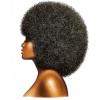 Submitted by Shaman Nakida on
Submitted by Shaman Nakida on

Image by Anastasiya Kolpakova from http://Pixabay.com
Many westerners who practice alternative medicine and those who seek their services are familiar with Traditional Chinese Medicine (such as acupuncture) or Ayurveda (the doshas). They are the most commonly used traditional medicine systems in the West. Yet, the continent of Africa is been deemed to be the birthplace of medicine as Hippocrates (the “father of medicine”) was said to have studied at the temple of Amenhotep.
Modern day Africa, like China, India and most other parts of the indigenous world, developed unique healing traditions adapted and defined by various cultural, spiritual and environmental influences. This system of healing has been satisfying the health needs of Africans for generations.
“Practitioners of western medicine do not understand – and even feel threatened – by a system that is steeped in ritual.”
The main problem with African Traditional Medicine (ATM) taking root in the western mindset is image. Maurice Iwu author of the Handbook of African Medicinal Plants (1993) reveals that “The popular image of the African medicine man is that of the fabled witch doctor, with his exotic paraphernalia of feathers, cowries and animal skin, muttering meaningless incantations and dispensing worthless potions to his ignorant clients.”
Practitioners of western medicine do not understand – and even feel threatened – by a system that is steeped in ritual. Traditional healers dressed in elaborate costumes who use spiritual and magical practices seem in direct opposition to the evidence-based approach of modern medicine. After all, it’s hard to document a shamanic vision in a clinical laboratory.
According to Africa Renewal, United Nations, traditional healers in African countries “divine the cause of a person’s illness by throwing bones to interpret the will of dead ancestors. Some healers say they directly channel the ancestral spirit through their bodies.” This divination process is the traditional form of diagnosis which views illness as having spiritual connections and thus must be interpreted in the same context. The ‘cure’ may involve further ritual and/or herbal/talismanic medicine.
Many traditional healers have in-depth knowledge of plant materials and their various curative powers which according to Iwu “cannot be reduced to simple herbalism.” It’s a complex mixture of science, culture and spirit. Western medicine views these practitioners as simply charlatans preying on the superstitions of the locals.
The sad truth is that charlatans exist in all walks of life. In every culture there are those who would take advantage of the ignorance and innocence of others. Traditional medicine is no exception, but that is no reason to discredit the system. In western culture, people don’t stop going to doctors because of a wrong diagnosis. Nor do they discontinue using pharmaceuticals even with their harmful side-effects. They simply sue the doctors and drug companies if something goes wrong.
“Renewed interest may very well position African Traditional Medicine as a viable player in the health of the people of Africa, and indeed, the world.”
ATM practitioners are proving that they can compete and sometimes supersede science with their systems of healing. Now there is increasing cooperation between western trained medical doctors and traditional healers in the treatment of devastating diseases such as AIDS as well as the establishment of unions and associations for traditional healers in various African countries. With this new found popularity, there is growing concern regarding biopiracy and intellectual property rights as drug companies are seeking to tap into the knowledge of these traditional healers without compensation. What they once viewed as quackery is now a an opportunity for profit.
Yet, it’s possible that this renewed interest may very well position African Traditional Medicine and healing systems as a viable player in the health of the people of Africa, and indeed, the world.
Aamirah Branch http://www.shamanportal.org/article_details.php?id=845